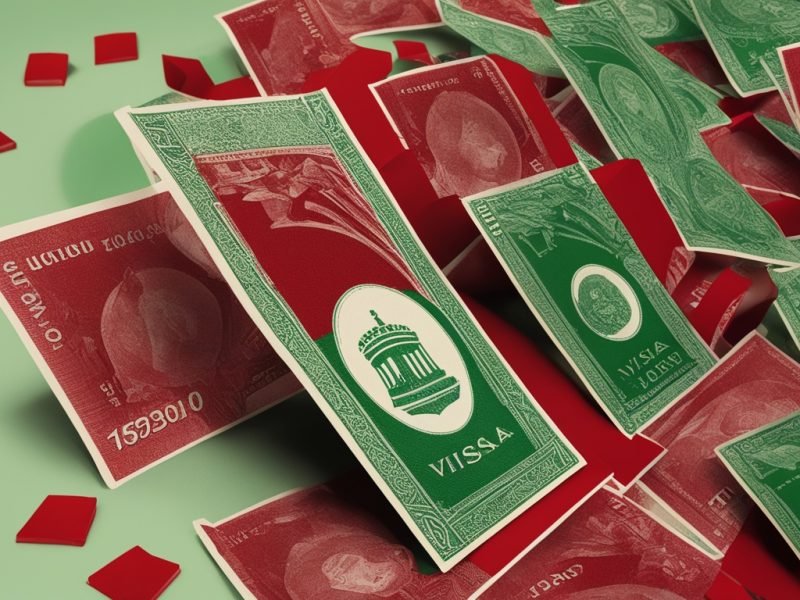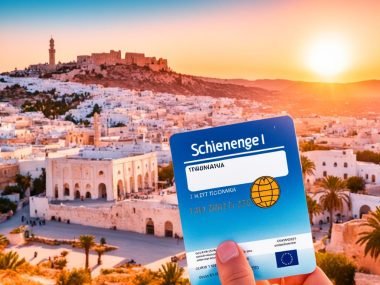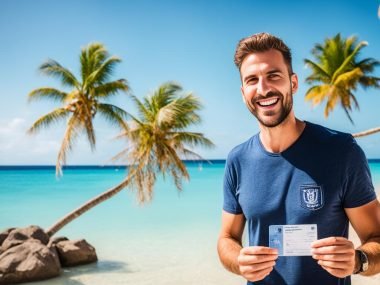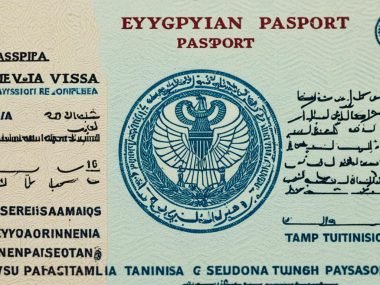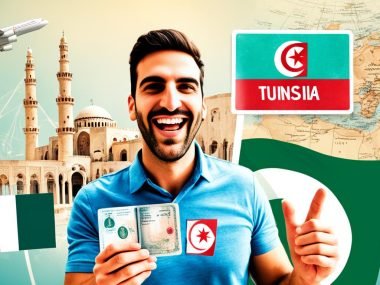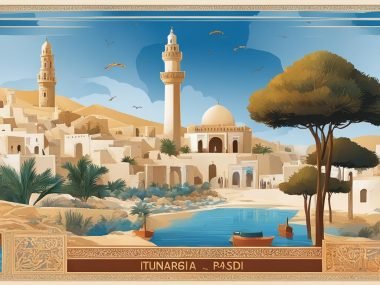Did you know more than half of people applying for visas don’t know the fee is non-refundable? It’s important to grasp the visa costs and what Tunisians pay. First, let’s look at the key money matters.
Every visa seeker from Tunisia, kids included, must pay the MRV fee. You need to pay this fee even if they don’t approve your visa. There’s a different fee for every type of visa. Also, you have to pay in local currency at an approved Attijari Bank.
Wait to plan your trip until you get your visa. This will help you avoid any hold-ups. Your payment slip is only good for one year after you get it. During this time, you must arrange your interview or send in your interview pass form. Knowing these rules helps make the visa process smoother.
Key Takeaways
- All visa applicants from Tunisia must pay a non-refundable MRV fee.
- The cost of the visa varies based on the type you apply for.
- Visa fees must be paid in local currency at Attijari Bank branches.
- The payment receipt is valid for 365 days for scheduling interviews or waivers.
- Do not make travel plans until your visa is printed to avoid delays.
Understanding the Different Types of US Visas
Going to the United States means learning about many visa types. Each one matches a different travel reason. From the business visa to the work visa, knowing what they need can make applying easier. This helps with planning costs and understanding embassy steps.
Business and Tourist Visas
The Business (B-1) and Tourist (B-2) Visas are for short visits. They suit those going for work meetings or holidays in the USA. Known as B visas, they’re perfect for seeing business associates, going to events, or just for fun. You must show documents to prove why you’re travelling and that you can pay for it.
Students and Exchange Visitors
Student (F and M) and Exchange Visitor (J) Visas are for education or cultural visits. They require proof of enrolment, sponsorship, and that you can pay for your studies. Knowing about the embassy’s process helps when applying for these visas.
Temporary Workers and Employment Visas
Visas for Temporary Workers, like the H-1B or H-2B, are for job or training opportunities in the USA. You must document your job offer and abilities. Understanding the process, including embassy steps, is key for a smooth application.
Special Category Visas
Special Category Visas are for unique situations. This includes the T visa for human trafficking victims and the O visa for those with extraordinary skills. Applicants need to carefully show their qualifications and reasons. Knowing embassy procedures and having the right documents is very important.
In summary, knowing well about all US visa types is very helpful. It can really improve your chances of getting your visa and having a good trip.
Visa Application Fees
Knowing all about visa application fees is very important. This applies if you’re going for a student visa, business visa, or any other kind. It’s wise to understand every fee involved. This stops any shock fees during your application.
Non-refundable MRV Fee
This MRV fee is a key part of applying for a visa. You must pay this fee no matter the visa type, such as for tourism or business. Remember, this fee is non-refundable. If you don’t pay, your application stops right away.
Fee Amount by Visa Type
Visa fees change based on the kind of visa you need. For example, non-immigrant visas for tourists or business folks have a regular fee. But, visas for Treaty Traders/Investors cost more because they need special paperwork. Checking the right fee for your visa is important to keep your application moving smoothly.
SEVIS Fees for Students and Exchange Visitors
If you’re a student or visiting on an exchange, you’ll have an extra fee called the SEVIS fee. SEVIS keeps track of international students and visitors. Make sure to include this fee in your budget to avoid delays in starting your study or exchange programme.
Fraud Prevention and Detection Fees
Some visa types, like blanket L petitions, have an extra Fraud Prevention and Detection Fee. This fee helps stop scams in the visa process. If you need to pay this fee, don’t forget to include it in your planning.
| Visa Type | Application Fee | Additional Fees |
|---|---|---|
| Tourist / Business Visa (B) | $160 | None |
| Student Visa (F, M) | $160 | SEVIS Fee |
| Treaty Trader/Investor Visa (E) | $205 | None |
| L Visa (Blanket petitions) | $190 | Fraud Prevention and Detection Fee |
Payment Information
Before you pay your visa fees in Tunisia, knowing your payment options is key. I’ll help you understand the steps for an easy process.
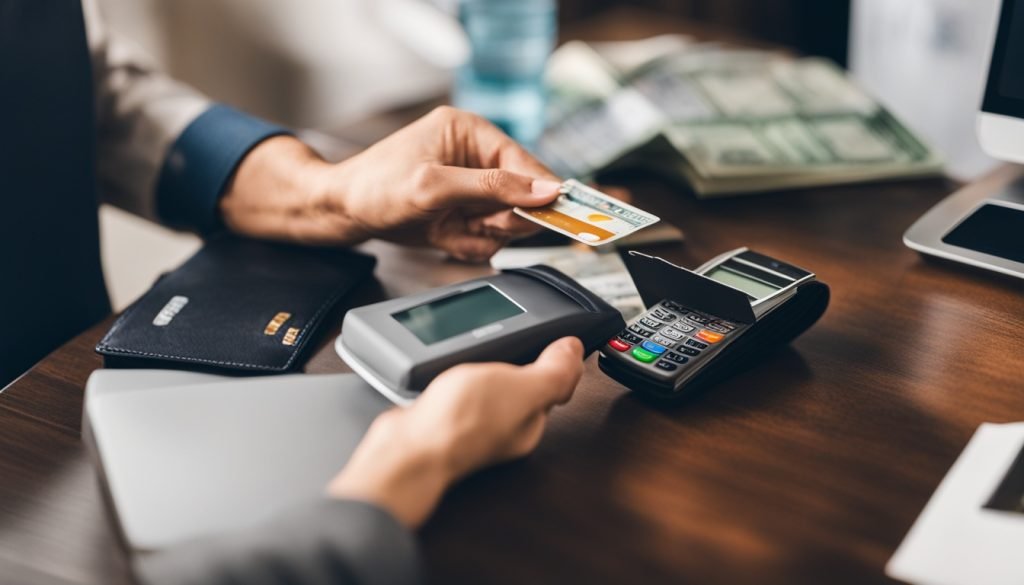
Where to Pay Visa Fees
In Tunisia, you need to pay visa fees at Attijari Bank branches. Even though prices are in U.S. dollars, you must pay in the local currency. This ensures you pay the correct amount and follow local rules.
Exchange Rates and Validity
Using local currency means exchange rates matter. Always check the current rate to avoid mistakes. Your payment slip is good for a year. In this time, you must book your interview or apply for a waiver.
Additional Costs and Travel Expenses
When you plan a trip from Tunisia to the US, remember it’s not just about visa fees. You need to think about flight prices, where you’ll stay, and daily spending in the USA. It’s important to plan these well so you have enough money.
Flight Costs
Flight prices can change your budget a lot. They change depending on when you book, which airline you choose, and the time of year. Booking early can help you get a good deal and avoid paying more last minute.
Accommodation and Living Expenses
What you pay for a place to stay is key. Prices for hotels, hostels, or apartments depend on where and how long you’re staying. Also, it’s vital to set aside money for daily needs like food, getting around, and fun activities. This helps you manage your money well on your trip.
| Category | Estimated Cost | Notes |
|---|---|---|
| Flight Costs | £300 – £1,200 | Prices vary by booking time and airline |
| Accommodation Expenses | £50 – £200 per night | Depends on type and location |
| Living Costs | £30 – £100 per day | Includes food, transportation, and leisure |
USA Visa Requirements
Getting a USA visa needs careful planning. It’s important to get all your papers ready and know the interview process. Make sure you have all needed proofs to show why you are visiting. Also, show that you plan to return to your home country.
Documentation Needed
Gathering the right documents is key. You need your passport, application forms, photos, and proof like money plans and trip details. It’s vital to show why you’re going to the USA and that you have enough money for your visit.
Establishing Ties Outside the USA
You must prove strong ties to your country. This means showing job letters, property papers, family ties, or money responsibilities. This proof helps show you will return after your visit. It’s a big part of getting your visa.
Interview Preparation
The interview is very important for the visa. Be ready to explain your travel reasons clearly and back them up with proof. Practise answering questions and always be honest and clear. Checking all your papers before the interview helps a lot.
Embassy Procedures in Tunisia
It’s important to know how the embassy in Tunisia works for visas. First, you must schedule an interview. You also need to understand what they expect from you. Let’s look at these steps one by one.
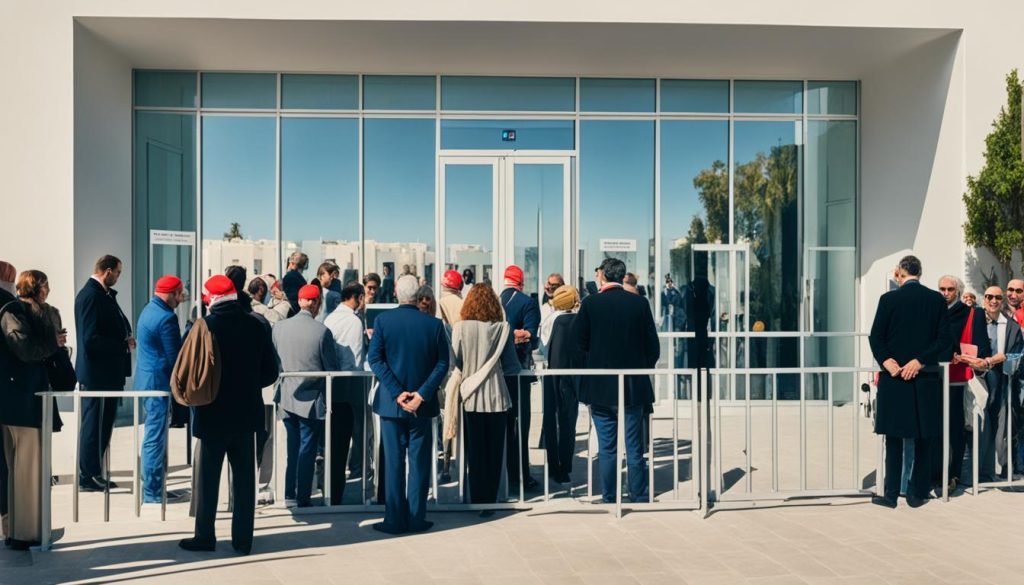
Scheduling an Interview
First, you pay the MRV fee. Then, you book your interview. This step is very important. Make sure to book your interview in the time the consulate says.
What to Expect During the Interview
The interview might seem scary, but being ready helps a lot. You should explain why you’re travelling clearly. Be sure to answer questions with confidence and have documents that show why you’re travelling.
Visa Processing Times
How long visas take depends on which visa it is and your situation. Usually, knowing how long it takes helps with travel plans. The number of applications and your details can change this time. So, it’s good to plan ahead.
Here is a table showing how long different visas usually take:
| Visa Category | Average Processing Time |
|---|---|
| Tourist Visa (B1/B2) | 2-4 weeks |
| Student Visa (F-1) | 3-5 weeks |
| Work Visa (H-1B) | 4-6 weeks |
Work Visa Application Steps
Looking to work in the USA? You must follow a clear work visa application process. This easy visa step-by-step guide will help you:
First, pick the right visa type for your job. For example, choose H-1B if you’re a specialised worker. L-1 is for moving within your company. O-1 is for those with great skills or achievements.
Collect all needed documents early. You need a job offer letter and employer details. Plus, paperwork that explains your job well. All must meet U.S. immigration rules.
Then, pay the needed fees. Everyone pays a Non-refundable MRV fee. Some will also pay a Fraud Prevention and Detection Fee. Be careful to pay correctly to avoid delays.
Next, set up your visa interview. This important step lets you share your work plans. Have all your documents ready. Be prepared to discuss your job and travel reasons.
Last, follow any extra steps for your type of visa. Stay up to date on how long it takes. And be patient as your application is looked at.
Follow this step-by-step guide closely to make your path to employment in the USA smoother.
Tourist Visa Application Tips
When applying for a tourist visa, it’s essential to be very careful and spot on. Follow these tourist visa guidance tips to boost your approval odds:
-
Make sure your application is complete and accurate. Check your details twice to avoid mistakes. Mistakes can cause delays or even lead to being denied. Starting right is key for your tourist visa guidance path.
-
Gather lots of substantiating material to show why you’re travelling. Include your trip plan, where you’ll stay, and money proof. This shows a well-thought-out travel story.
-
Show you plan to come back home. This proves you won’t stay too long. It’s a crucial step for visa application tips.
-
Don’t book things you can’t cancel before getting your visa. It saves money if there’s a delay. This step avoids losing money due to unexpected processing delays.
-
Get ready for the interview. Practice clear answers about why you’re travelling. This shows you’re serious and have thought it all through.
A well-done application can make getting a visa easier and less stressful. Stick to these tourist visa guidance tips and focus on the small stuff. This will lead to a smoother, more sure journey.
Conclusion
For a successful US visa from Tunisia, know the visa needs well. Each step, like paying the MRV fee and setting up your interview, needs careful planning. It’s key to start early to make the process easier.
Plan ahead, especially for costs like the visa fee, any extra fees, and travel costs. Being proactive helps meet deadlines and get all needed documents. This makes your application stronger.
Following the guidelines closely helps navigate the visa steps. It’s important to show your unique situation and goals clearly. By doing this, Tunisians can have an easier time getting their visa and going to the United States.

